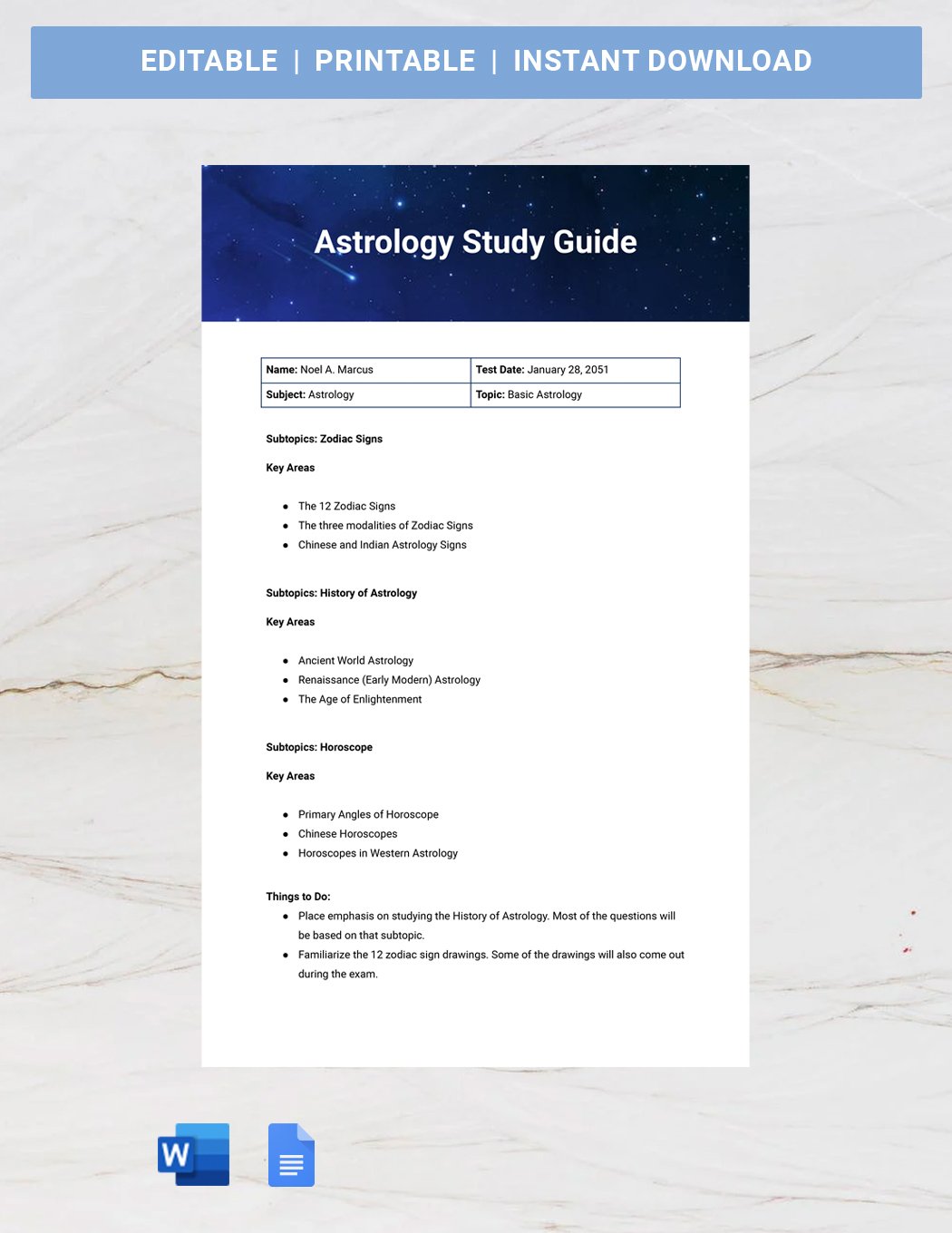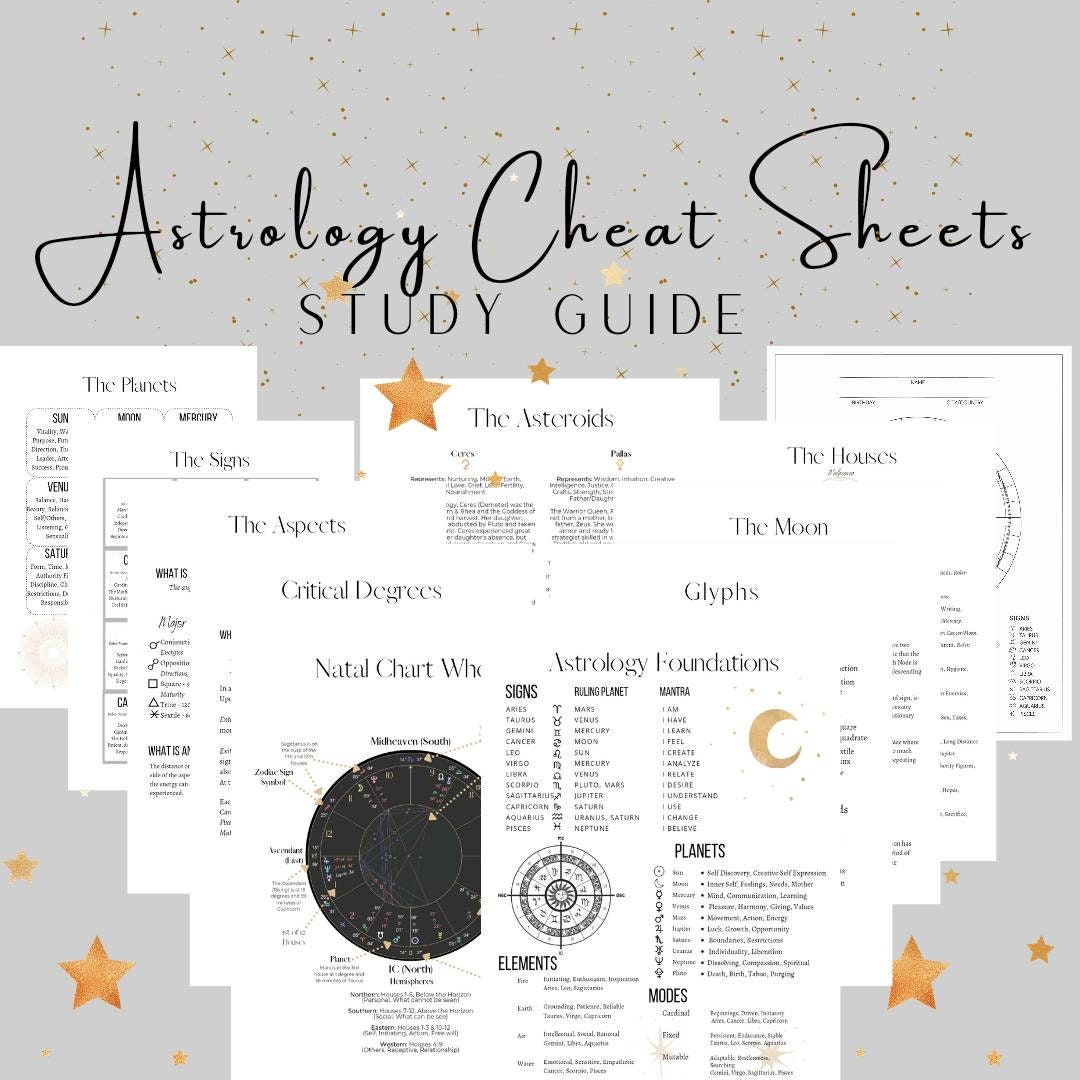Astrology has become an increasingly popular subject in recent years, capturing the interest of individuals seeking deeper insights into their personalities, relationships, and life paths. If you're intrigued by astrology and want to explore its fascinating world, this study guide will serve as your ultimate companion. Whether you're a complete beginner or someone looking to enhance your understanding, this article provides all the essential information you need to get started.
From understanding the basics of zodiac signs and planetary influences to interpreting birth charts, astrology offers a rich tapestry of knowledge that can help you make sense of the universe and your place within it. This guide aims to simplify complex concepts while maintaining the depth and authenticity that astrology deserves.
By the end of this article, you'll have a solid foundation in astrology, empowering you to explore further and apply its principles to your everyday life. Let's dive into the captivating world of astrology and unlock its mysteries together.
Read also:Viral One Piece Swimsuit The Ultimate Guide To Style Comfort And Popularity
Table of Contents
- Introduction to Astrology
- Understanding the Zodiac Signs
- The Role of Planets in Astrology
- Astrological Houses Explained
- How to Read a Birth Chart
- Aspects in Astrology
- Types of Astrology
- Astrology in the Modern World
- Benefits of Studying Astrology
- Recommended Resources for Astrology Study
Introduction to Astrology
Astrology is a profound study of the movements and relative positions of celestial bodies interpreted as having an influence on human affairs and the natural world. It dates back thousands of years, with roots in ancient civilizations such as Mesopotamia, Egypt, and Greece. These cultures believed that the positions of the stars and planets could influence everything from weather patterns to individual destinies.
In modern times, astrology study guide materials have evolved to include more accessible resources, from online courses to mobile apps, making it easier than ever for enthusiasts to learn and practice astrology. However, understanding the core principles requires dedication and a willingness to delve into its intricate details.
To begin your journey, it's crucial to familiarize yourself with the basic components of astrology, such as the zodiac signs, planets, houses, and aspects. Each of these elements plays a significant role in shaping the overall picture of an individual's astrological profile.
Understanding the Zodiac Signs
What Are the Zodiac Signs?
The zodiac is divided into twelve signs, each representing different personality traits and characteristics. These signs are based on the constellations that the Sun passes through during its annual journey across the sky. Understanding the zodiac signs is fundamental to astrology, as they form the building blocks of an individual's natal chart.
- Aries: March 21 - April 19
- Taurus: April 20 - May 20
- Gemini: May 21 - June 20
- Cancer: June 21 - July 22
- Leo: July 23 - August 22
- Virgo: August 23 - September 22
- Libra: September 23 - October 22
- Scorpio: October 23 - November 21
- Sagittarius: November 22 - December 21
- Capricorn: December 22 - January 19
- Aquarius: January 20 - February 18
- Pisces: February 19 - March 20
Elements and Modalities
Each zodiac sign is associated with one of the four elements—Fire, Earth, Air, and Water—and one of the three modalities—Cardinal, Fixed, and Mutable. These classifications provide additional insights into the nature of each sign and how it interacts with others.
For example, Fire signs (Aries, Leo, Sagittarius) are known for their passion and energy, while Water signs (Cancer, Scorpio, Pisces) are deeply emotional and intuitive. Understanding these elemental and modal qualities can enhance your ability to interpret astrological charts accurately.
Read also:Ultimate Guide To Black Timberlands Outfit Style Comfort And Versatility
The Role of Planets in Astrology
Planets are central to astrology, as they represent various aspects of human experience and personality. In astrology, the term "planet" includes not only the traditional planets but also the Sun, Moon, and other celestial bodies like Pluto and Chiron. Each planet governs specific areas of life and influences different parts of an individual's chart.
Key Planets and Their Meanings
- Sun: Represents the core self, ego, and vitality.
- Moon: Symbolizes emotions, instincts, and inner world.
- Mercury: Governs communication, thought processes, and learning.
- Venus: Associated with love, beauty, and values.
- Mars: Represents action, drive, and ambition.
By studying the positions and aspects of these planets, astrologers can gain valuable insights into an individual's strengths, weaknesses, and life patterns.
Astrological Houses Explained
Astrological houses represent different areas of life, such as career, relationships, and home. There are twelve houses in total, each corresponding to a specific aspect of existence. The placement of planets within these houses further refines the interpretation of an astrological chart.
Significance of Houses in Astrology
For instance, the first house, also known as the Ascendant, relates to self-image and how others perceive you. The seventh house, on the other hand, pertains to partnerships and relationships. Understanding the houses allows astrologers to create a more nuanced and personalized reading for each individual.
How to Read a Birth Chart
A birth chart, or natal chart, is a snapshot of the sky at the exact moment and location of your birth. It includes the positions of the planets, zodiac signs, and houses, providing a comprehensive overview of your astrological profile.
Steps to Create a Birth Chart
- Gather your birth data, including date, time, and place of birth.
- Use online tools or software to generate your chart.
- Interpret the chart by analyzing the positions of planets, signs, and houses.
Learning to read a birth chart is a crucial skill for anyone serious about studying astrology. It requires practice and patience but offers invaluable insights into your unique cosmic blueprint.
Aspects in Astrology
Aspects are angles formed between planets in a birth chart. These angles can indicate harmonious or challenging interactions between planetary energies. Common aspects include conjunctions, oppositions, trines, squares, and sextiles.
Understanding Aspect Dynamics
For example, a conjunction occurs when two planets are close together, amplifying their combined energy. An opposition, however, signifies tension or conflict between two opposing forces. Recognizing and interpreting these aspects is essential for gaining a deeper understanding of astrological charts.
Types of Astrology
While Western astrology is the most well-known, there are several other forms of astrology practiced around the world. Each type offers unique perspectives and methods of interpretation.
- Vedic Astrology: Originating from India, Vedic astrology emphasizes the influence of nakshatras (lunar mansions).
- Chinese Astrology: Based on the lunar calendar, Chinese astrology uses a twelve-year cycle represented by animal signs.
- Tibetan Astrology: Combines elements of Vedic and Chinese astrology with Buddhist philosophy.
Exploring different types of astrology can broaden your understanding and appreciation of this ancient practice.
Astrology in the Modern World
In today's fast-paced world, astrology continues to gain popularity as people seek meaningful connections and self-awareness. Social media platforms and digital tools have made astrology more accessible than ever before, allowing enthusiasts to connect and share their knowledge.
Despite its growing acceptance, astrology still faces skepticism from some quarters. However, its enduring appeal lies in its ability to provide insights and guidance that resonate with individuals on a personal level.
Benefits of Studying Astrology
Studying astrology offers numerous benefits, both personally and professionally. It can enhance self-awareness, improve interpersonal relationships, and foster a deeper understanding of life's cycles and patterns.
Professionally, astrology can be applied in fields such as counseling, coaching, and even business strategy. By recognizing astrological influences, individuals can make more informed decisions and align their actions with cosmic energies.
Recommended Resources for Astrology Study
For those eager to delve deeper into astrology, there are many excellent resources available. Books, online courses, and workshops can provide structured learning opportunities, while astrology communities offer support and encouragement.
- Books: "Astrology for Beginners" by David Fontaine, "The Only Astrology Book You'll Ever Need" by Joanna Martine Woolfolk.
- Online Courses: Astrology.com, Coursera, Udemy.
- Communities: Reddit's r/astrology, Facebook astrology groups.
By leveraging these resources, you can build a strong foundation in astrology and continue your journey of discovery.
Conclusion
This astrology study guide has provided a comprehensive overview of the key components and principles of astrology. From understanding the zodiac signs and planets to interpreting birth charts and aspects, you now possess the tools to explore this fascinating field further.
We encourage you to share your thoughts and experiences in the comments section below. Additionally, feel free to explore other articles on our site for more insights into astrology and related topics. Remember, the more you study and practice astrology, the deeper your understanding will become. Happy stargazing!


